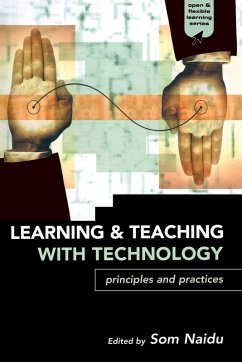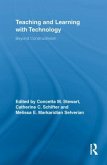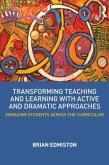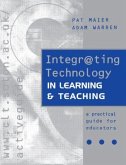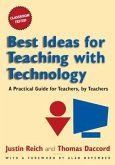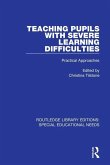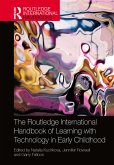Naidu / Som (eds.)Principles and Practices
Learning and Teaching with Technology
Principles and Practices
Herausgeber: Naidu, Som
Naidu / Som (eds.)Principles and Practices
Learning and Teaching with Technology
Principles and Practices
Herausgeber: Naidu, Som
- Broschiertes Buch
- Merkliste
- Auf die Merkliste
- Bewerten Bewerten
- Teilen
- Produkt teilen
- Produkterinnerung
- Produkterinnerung
Exploring the creative opportunities opened up by ICT in the modern classroom, this text presents an authoritative survey of ICT's impact upon core teaching functions, and draws from the experiences of leading practitioners in the field.
Andere Kunden interessierten sich auch für
![Teaching and Learning with Technology Teaching and Learning with Technology]() Teaching and Learning with Technology69,99 €
Teaching and Learning with Technology69,99 €![Online Learning and Teaching with Technology Online Learning and Teaching with Technology]() David Murphy (ed.)Online Learning and Teaching with Technology62,99 €
David Murphy (ed.)Online Learning and Teaching with Technology62,99 €![Transforming Teaching and Learning with Active and Dramatic Approaches Transforming Teaching and Learning with Active and Dramatic Approaches]() Brian EdmistonTransforming Teaching and Learning with Active and Dramatic Approaches100,99 €
Brian EdmistonTransforming Teaching and Learning with Active and Dramatic Approaches100,99 €![Integr@ting Technology in Learning and Teaching Integr@ting Technology in Learning and Teaching]() Pat MaierIntegr@ting Technology in Learning and Teaching44,99 €
Pat MaierIntegr@ting Technology in Learning and Teaching44,99 €![Best Ideas for Teaching with Technology Best Ideas for Teaching with Technology]() Justin ReichBest Ideas for Teaching with Technology55,99 €
Justin ReichBest Ideas for Teaching with Technology55,99 €![Teaching Pupils with Severe Learning Difficulties Teaching Pupils with Severe Learning Difficulties]() Teaching Pupils with Severe Learning Difficulties48,99 €
Teaching Pupils with Severe Learning Difficulties48,99 €![The Routledge International Handbook of Learning with Technology in Early Childhood The Routledge International Handbook of Learning with Technology in Early Childhood]() The Routledge International Handbook of Learning with Technology in Early Childhood52,99 €
The Routledge International Handbook of Learning with Technology in Early Childhood52,99 €-
-
-
Exploring the creative opportunities opened up by ICT in the modern classroom, this text presents an authoritative survey of ICT's impact upon core teaching functions, and draws from the experiences of leading practitioners in the field.
Produktdetails
- Produktdetails
- Verlag: Routledge
- Seitenzahl: 320
- Erscheinungstermin: 10. Februar 2005
- Englisch
- Abmessung: 234mm x 156mm x 17mm
- Gewicht: 488g
- ISBN-13: 9780415346108
- ISBN-10: 041534610X
- Artikelnr.: 22533897
- Herstellerkennzeichnung
- Libri GmbH
- Europaallee 1
- 36244 Bad Hersfeld
- gpsr@libri.de
- Verlag: Routledge
- Seitenzahl: 320
- Erscheinungstermin: 10. Februar 2005
- Englisch
- Abmessung: 234mm x 156mm x 17mm
- Gewicht: 488g
- ISBN-13: 9780415346108
- ISBN-10: 041534610X
- Artikelnr.: 22533897
- Herstellerkennzeichnung
- Libri GmbH
- Europaallee 1
- 36244 Bad Hersfeld
- gpsr@libri.de
Dr Som Naidu is Associate Professor and Head of Research and Evaluation in the Department of Teaching, Learning and Research Support at the University of Melbourne, Australia. A respected figure in the field of open, flexible and distance education, he is an award-winning researcher and practitioner in online teaching and learning who has been published widely. His work has won awards from the International Society for Performance Improvement and the Open and Distance Learning Association of Australia. He is editor of the T&F journal Distance Education.
Introduction Part I Content Representation 1 Model facilitated learning 2
Implicit theories of learning and change: their role in the development of
e-learning environments for higher education 3 Designing graphical,
interactive simulations to model scientific problem solving 4 Optimising
domain knowledge representation with multimedia objects Part II Activation
of Learning 5 Using interactive video-based multimedia to scaffold learning
in teacher education 6 Using authentic patient encounters to engage in
medical students in a problem-based learning curriculum 7 Virtual learning
in cultural studies: matching subject content and instructional delivery 8
Replicating practice complexities-multimedia innovation in social work
education Part III Providing socialization support 9 Technology and second
language learning through socialization 10 Developing social Prescence in
online course discussions 11 Socialisation through CMC in differently
structured environments 12 Collaboration and community through
simulation/role-play Part IV Assessment of learning outcomes 13 Broadening
assessment strategies with information technology 14 Applying assessment
principles and expanding the focus of assessment to enhance learning online
15 The use of online assessment in stimulating a deeper approach to
learning 16 Cognitive apprenticeship learning-ensuring far transfer of
knowledge through computer-based assessment Part V Providing Feedback 17 A
feedback model and successful e-learning
Implicit theories of learning and change: their role in the development of
e-learning environments for higher education 3 Designing graphical,
interactive simulations to model scientific problem solving 4 Optimising
domain knowledge representation with multimedia objects Part II Activation
of Learning 5 Using interactive video-based multimedia to scaffold learning
in teacher education 6 Using authentic patient encounters to engage in
medical students in a problem-based learning curriculum 7 Virtual learning
in cultural studies: matching subject content and instructional delivery 8
Replicating practice complexities-multimedia innovation in social work
education Part III Providing socialization support 9 Technology and second
language learning through socialization 10 Developing social Prescence in
online course discussions 11 Socialisation through CMC in differently
structured environments 12 Collaboration and community through
simulation/role-play Part IV Assessment of learning outcomes 13 Broadening
assessment strategies with information technology 14 Applying assessment
principles and expanding the focus of assessment to enhance learning online
15 The use of online assessment in stimulating a deeper approach to
learning 16 Cognitive apprenticeship learning-ensuring far transfer of
knowledge through computer-based assessment Part V Providing Feedback 17 A
feedback model and successful e-learning
Introduction Part I Content Representation 1 Model facilitated learning 2
Implicit theories of learning and change: their role in the development of
e-learning environments for higher education 3 Designing graphical,
interactive simulations to model scientific problem solving 4 Optimising
domain knowledge representation with multimedia objects Part II Activation
of Learning 5 Using interactive video-based multimedia to scaffold learning
in teacher education 6 Using authentic patient encounters to engage in
medical students in a problem-based learning curriculum 7 Virtual learning
in cultural studies: matching subject content and instructional delivery 8
Replicating practice complexities-multimedia innovation in social work
education Part III Providing socialization support 9 Technology and second
language learning through socialization 10 Developing social Prescence in
online course discussions 11 Socialisation through CMC in differently
structured environments 12 Collaboration and community through
simulation/role-play Part IV Assessment of learning outcomes 13 Broadening
assessment strategies with information technology 14 Applying assessment
principles and expanding the focus of assessment to enhance learning online
15 The use of online assessment in stimulating a deeper approach to
learning 16 Cognitive apprenticeship learning-ensuring far transfer of
knowledge through computer-based assessment Part V Providing Feedback 17 A
feedback model and successful e-learning
Implicit theories of learning and change: their role in the development of
e-learning environments for higher education 3 Designing graphical,
interactive simulations to model scientific problem solving 4 Optimising
domain knowledge representation with multimedia objects Part II Activation
of Learning 5 Using interactive video-based multimedia to scaffold learning
in teacher education 6 Using authentic patient encounters to engage in
medical students in a problem-based learning curriculum 7 Virtual learning
in cultural studies: matching subject content and instructional delivery 8
Replicating practice complexities-multimedia innovation in social work
education Part III Providing socialization support 9 Technology and second
language learning through socialization 10 Developing social Prescence in
online course discussions 11 Socialisation through CMC in differently
structured environments 12 Collaboration and community through
simulation/role-play Part IV Assessment of learning outcomes 13 Broadening
assessment strategies with information technology 14 Applying assessment
principles and expanding the focus of assessment to enhance learning online
15 The use of online assessment in stimulating a deeper approach to
learning 16 Cognitive apprenticeship learning-ensuring far transfer of
knowledge through computer-based assessment Part V Providing Feedback 17 A
feedback model and successful e-learning

